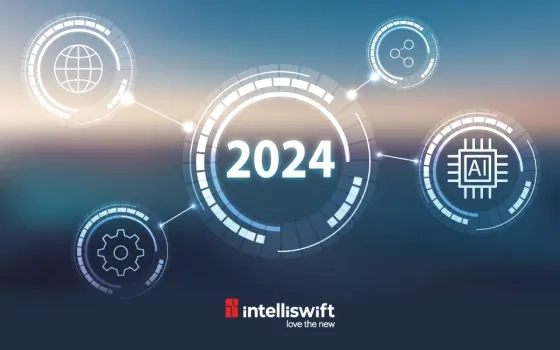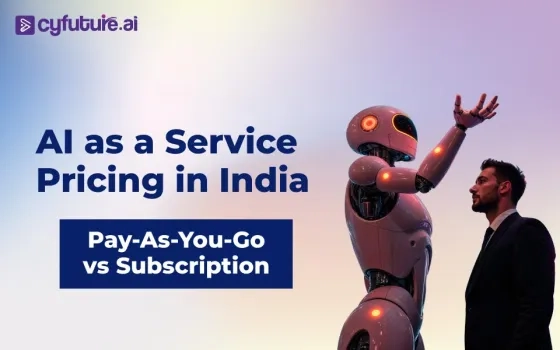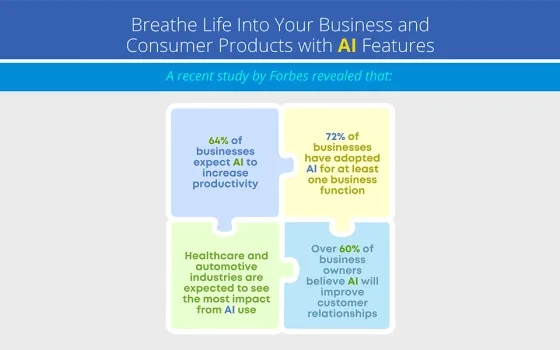Amid rapid technological disruption and a climate of uncertainty, enterprises face the importance of re-evaluating the technology trends that will define 2024. The ever-evolving digital landscape prompts IT leaders to consider its far-reaching impact on various facets of their business. As we look ahead to 2024, it is essential to anticipate the key trends that will sculpt the technological terrain.
In this blog, we identify the pivotal technologies and platforms that will not only fuel growth but also drive digitalization and efficiency in the next year. Let's delve into the top strategic technology trends set to revolutionize industries and spur innovation in the coming year.
1. Sustainable Technology: Nurturing a Greener Tomorrow
As the environmental impact of technology continues to rise, CIOs are compelled to devise sustainable strategies by promoting Environmental, Social, and Governance (ESG) objectives. Beyond energy efficiency, sustainability encompasses ethical sourcing, minimal waste, eco-conscious design, long-term ecological balance, and human rights. Gartner predicts that by 2027, 80% of the CIOs will have performance metrics tied to the sustainability of the IT organizations. Lately, this responsibility has slowly cascaded down to infrastructure and operations leaders (I&O) to make their IT environment more sustainable, particularly around data centers. For instance, sustainable tech initiatives in data centers can lead to substantial reductions in carbon emissions.
2. Platform Engineering: Architecting the Digital Foundation
As businesses increasingly prioritize digital transformation and agile development practices, the demand for robust platform engineering solutions will surge in 2024. Platform engineering involves designing, building, and maintaining the underlying infrastructure and systems that enable the development, deployment, and operation of software applications or services. Platform engineering significantly benefits developers by providing a stable and optimized environment for building and deploying applications. It simplifies and automates many aspects of the development process, allowing developers to focus on writing code and creating features rather than dealing with infrastructure concerns. For instance, cloud-native platforms like Kubernetes help developers by automating the deployment, scaling, and management of containerized applications. It streamlines the process of running applications, ensures they use resources efficiently and handles tasks like scaling, fault tolerance, and service discovery.
Additionally, platform engineering makes it easier for developers to collaborate and ensure consistency across projects. By creating robust, scalable platforms, businesses can accelerate their digital transformation.
3. AI-Augmented Development: Amplifying Human Potential
In 2024, AI-augmented development is poised to revolutionize how enterprises create software. This technology harnesses the capabilities of artificial intelligence (AI) to bolster various stages of the software development process. This includes aiding developers in tasks ranging from coding, testing, and debugging to crafting user interfaces. For instance, AI can automatically generate code, scrutinize and enhance existing code, and streamline the testing process. Additionally, it can offer valuable insights drawn from past project data.
With a suite of AI-powered tools and platforms, this approach empowers developers to craft applications with heightened efficiency, speed, and reliability compared to traditional manual coding. For example, tools like Copilot, leveraging OpenAI's advanced code, can generate code segments based on context or specific instructions. This collaboration between human expertise and AI capabilities will drive accelerated development cycles, resulting in the creation of more innovative, more intuitive applications.
4. Intelligent Applications: Enhancing User Experiences
In 2024, individuals with minimal coding knowledge will find it increasingly easy to start coding. Intelligent applications enable both novice developers, often referred to as citizen developers, and experienced professionals to construct software applications swiftly. These applications leverage various forms of artificial intelligence (AI) and machine learning to enhance functionality and provide more sophisticated user experiences. Here, machine learning algorithms will enable predictive analytics, personalization, and automation. For instance, intelligent chatbots will give real-time, context-aware responses, revolutionizing customer service experiences. By utilizing intelligent apps, enterprises can harness their investments in business intelligence (BI) and data to catalyze data-driven decision-making seamlessly integrated into daily workflows.
5. Industry Cloud Platform: Tailored Solutions for Verticals
Recently, there has been a cutting-edge advancement in cloud computing tailored to meet the specialized requirements of sectors like healthcare, finance, and manufacturing. They provide industry-specific applications, services, and tools, streamlining operations and addressing sector-specific challenges. For example, Salesforce's Health Cloud is finely tuned for the healthcare industry, offering tools for patient management, telemedicine, and personalized care. Anticipated to be a trending technology in 2024, these platforms are projected to play an even more pivotal role, with Gartner predicting that by 2027, industry cloud platforms will drive over 50% of vital business initiatives for enterprises, a significant increase from less than 10% in 2021.
6. Cybersecurity: Safeguarding the Digital Frontier
In 2024, cybersecurity will become even more pivotal as the threat landscape escalates with increasingly sophisticated cyberattacks. The increasing remote work and interconnected devices further widen these potential vulnerabilities. Regulatory bodies are imposing stricter compliance measures, with significant penalties for non-compliance. To combat these challenges, many enterprises are set to adopt cutting-edge approaches such as Zero-trust models, AI-powered threat detection, and quantum-resistant encryption. Technologies like Palo Alto Networks' Cortex XDR exemplify this trend, providing comprehensive cybersecurity solutions tailored to the evolving digital landscape.
7. Talent Solutions: Navigating the Skills Landscape
According to McKinsey, an overwhelming 90% of enterprises are already grappling with a looming skills gap. With the surge in digitalization and automation, many are transitioning to new occupations. Therefore, attracting and retaining top-tier tech talent will become paramount. To thrive in this digital era, businesses must implement inventive talent solutions, such as robust upskilling initiatives and adaptable workforce strategies. Additionally, as industries continue to evolve, having the right skills will be essential for employees to adapt to new technologies and methodologies. Therefore, in 2024, actively addressing the skills gap will be a strategic imperative for businesses aiming to thrive in the rapidly changing technological landscape.
8. APIs: Orchestrating Seamless Integration
In 2024, APIs (Application Programming Interfaces) will play an even more pivotal role in the digital enterprise ecosystem. As businesses increasingly rely on interconnected systems and cloud-based services, APIs become crucial for seamless application communication. APIs facilitate the rapid exchange of data and functionality, enabling companies to innovate and deliver new services more efficiently. Moreover, they empower organizations to tap into a broader ecosystem of third-party services and platforms, driving innovation and expanding market reach. Failing to leverage APIs effectively could result in missed opportunities for efficiency gains and competitive advantage.
Embracing the Future
As we enter 2024, these strategic technology trends will shape industries and redefine how we interact with the digital world. Staying abreast of these developments and adopting a proactive approach to innovation will be key to success. Embracing these trends not only ensures competitiveness but also paves the way for a more connected, intelligent, and sustainable future.




















